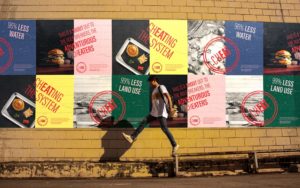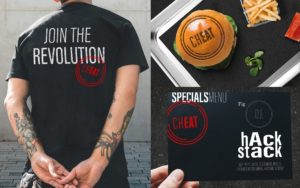
The meat-free foods industry is now being valued at over £572m. It’s clear to see that the UK’s appetite for animal-free foods is only growing. Plant-based alternatives are booming, but how ready are we for the lab-grown alternatives?
Incidentally, it’s not just vegans driving these sales. Many people are switching to plant-based alternatives for health reasons, animal welfare concerns, or to live a more sustainable lifestyle. Fuelled by hard-hitting documentaries and social media appraisal from celebrity influencers, sustainability has risen to stand for a new code of luxury, especially amongst younger generations.
Waitrose, which was the first UK supermarket to install dedicated vegan sections, reports that the 18-to-34 age group is the most likely to switch to veganism. With such a captive audience it’s unsurprising we’ve seen a boom in vegan products. Mintel counts a doubling in global launches over the past five years. Sainsbury’s latest report, ‘Future of Food’, suggested that by 2050 it could be selling grow-your-own meat kits from ‘lab-grown’ aisles.
Meanwhile, recently it was announced that, under proposed EU Food Rules, names currently used for meat will be reserved exclusively for products containing meat, even though this terminology has been used successfully for decades in the free-from realm. These new naming restrictions will mean that veggie ‘burgers’, ‘sausages’ and ‘steaks’ will need a rebrand, and producers need to get creative if they’re to prevent unpalatable alternatives like ‘vegetable protein tubes’ hitting the shelves.
It’s easy to assume that this decision has been pushed by the meat industry, which is panicked by young people moving away from meat. But this is not to suggest that meat will disappear from menus. Vegans only make up 2% of the UK population, and 91% of British households are still purchasing meat and dairy products. Meat-free alternatives may be appealing to the early adopters, but how adventurous is the majority?

In the next few years it is expected that controversial lab-grown meat will arrive on our plates. The world’s first lab-grown burger was eaten in August 2013 at a staggering cost of £215,000, but by 2015 the price had dropped to a more reasonable £5. The race is now on to bring a commercially viable product to market.
In theory, synthetic meat offers a ‘miracle’ solution to many major environmental issues; a 78-96% reduction in greenhouse gas emissions, 82-92% less water and 99% less land use. But what we are still to learn is, will anyone actually want to eat it? The technology may be within our midst, but huge barriers remain; trust, taste concerns, food neophobia and an aversion to the very concept.
Interestingly, results from various studies highlight a substantial cultural disparity on the acceptance of lab grown meat. SURVEYGOO found that almost a third of consumers said they would be happy to eat ‘cultured meat’ – surprisingly, vegans are the group most likely to do so (60%). While FRONTIERS found that 59.3% of consumers in China, and 48.7% in India, would be very likely to buy ‘clean’ lab grown meat, compared to just 18% in the UK.
Fundamentally, branding will be the catalyst to change consumer reservations, encourage trial and address the unique regional hesitations and motivations. It’s an exciting time for food innovation, and by supporting its journey to market with honest communications and charismatic branding, we can use design as a vehicle for behaviour change that will benefit the individual, their community and the world at large.
Re-Thinking Fast Food Packaging

August 22 is National Burger Day. At Echo, we have taken the opportunity to explore a creative challenge by imagining the not so distant future with the UK’s first fast food joint to serve up lab-grown meat.
Introducing CHEAT, a fast food joint aimed at the adventurous eaters. The Netflix documentary viewers who watched Cowspiracy and are looking to progressive brands and the intelligently anarchistic who are ready to join the lab grown meat revolution.
We have gone wide of clichéd organic visual codes to build a brighter, bolder aesthetic that has confidence and taste appeal. Avoiding dry science, the messaging delivers facts with wit, presenting CHEAT as a worthy yet indulgent lifestyle brand. As well as the brand itself, we’ve considered the packaging materials and accompaniments.
London based start-up Skipping Rocks Lab has an alternative packaging solution called ‘Ooho’, that uses Notpla to make sachets. Notpla is a revolutionary material made from seaweed and plants, which naturally biodegrades in 4-6 weeks. Chip[s] Board has developed a range of innovative and sustainable circular economy materials using potato waste.
Growing Underground produces sustainably grown, mouth-wateringly fresh micro greens and salad leaves grown 33 metres below the busy streets of London, with their hydroponics system using 70% less water than traditional open-field farming.
Article by Jenny Cook, Strategist at Echo.

About Jenny:
Jenny Cook is a creative, ideas-driven strategist with a passion for problem-solving particularly within the areas of sustainability and ethical design.
Jenny started her career as a graphic designer, spending 4 years working at International Branding agencies with experience on Global FMCG clients such as Unilever, P&G, Nestlé and Mondelez in the areas of food, drink and personal care using design to influence positive attitudes and behaviour by combining her creative craft and strategic logic.
Jenny’s naturally analytical and human-centred approach to design soon led her to join the strategy team. Her diverse background and broad perspective enable her to get to the heart of complex consumer-brand challenges at pace and move seamlessly into ideation. She is a creative thinker who balances art and pragmatism to deliver real world solutions. She is extremely passionate about sustainability and ethical fashion as well as being an avid netballer and addict of podcasts!
Source: Echo

You must be logged in to post a comment Login